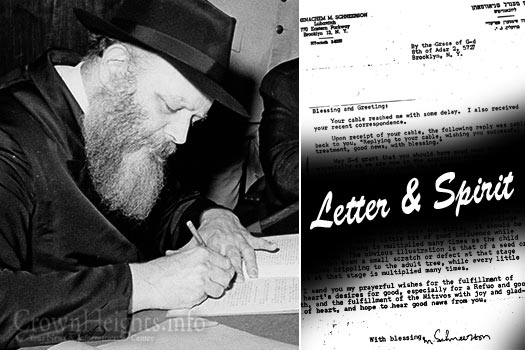
Letter and Spirit: The Essence of a Jew
In this week’s edition of Letter and Spirit, we present a letter from the Rebbe in which he uses the classic teachings of Rabbi Akiva to explain the essence of a Jew, and uses the scientific method in making his point. The letter was written through the Rebbe’s trusted secretary Rabbi Nissan Mindel, and was made available by the latter’s son-in-law, Rabbi Sholom Ber Shapiro.
This weekly feature is made possible by a collaboration between CrownHeights.info and Nissan Mindel Publications. Once a week we publish a unique letter of the Rebbe that was written originally in the English language, as dictated by the Rebbe to Rabbi Mindel.
********
By the Grace of G-d
7th of Nissan, 5740
Brooklyn, N.Y.
Mr.
Ann Arbor, Mich. 48109
Greeting and Blessing:
This is to acknowledge receipt of your letter in which you write on various aspects of Torah and Yiddishkeit etc., requesting a reply.
No doubt you understand that these are topics that can hardly be discussed adequately in a letter. Besides, there is no need for it, inasmuch as here is a wealth of articles and books in which all aspects of Yiddishkeit have been discussed, and you can also discuss them personally with knowledgeable people in your community, especially as you mention several by name.
However, inasmuch s you have written to me, I will discuss very briefly several pertinent points.
There are matters over which a human being has control and can change and not merely a human being, but also in the so-called animal kingdom, certain species can adapt themselves to changing conditions in terms of habitat, diet, etc. But insofar as one’s essence is concerned, this is not something that is left to a person’s choice. By way of a well known analogy, our Sages cite the example of a fish which, when taken out of its vital element, the water, will for a time feel very distressed and could not survive. Yet there are occasions when some fishes jump out of the water and are trapped on the shore. Unless they can in some way get back to their own element, their fate is inevitable.
The Torah and mitzvos and Yiddishkeit in general, are for a Jew what water is to a fish. There have always been Jews, individuals or groups, who attempted to jump out of their element and seek other pastures. Historically, this resulted in one of two ways: either they returned to the fold or were eventually lost to the Jewish people. The only difference is that insofar as a fish is concerned, it can be out of its element for a relatively short period of time, but in the case of Jews who deviate from authentic Judaism, G-d gives them a longer opportunity to return, and this may sometimes take years. If one will take the trouble to reflect on our Jewish history, which is more than three thousand years old, it will be seen that there have been deviating movements ever since the Golden Calf worshippers right after the Torah was given at Sinai but, as mentioned, the results have always been the same, either-or: either they did teshuva or were completely lost through assimilation and the like.
Noting in your letter that you are about to graduate from college and surely have some acquaintance with the scientific method, I trust it is unnecessary to explain to you that in every branch of true science, conclusions are made on the basis of actual experience and facts, even if the facts in themselves are not understood fully. The true scientist will accept the facts and will try or understand them, but it would be both illogical and unscientific to ignore the facts only because they are not fully understood.
To summarize the above, at any rate briefly: while a Jew has the choice of being one hundred percent observant or less, since the Creator has given every human being free choice of conduct, such a decision is limited only to the actual conduct, but the inevitable results are clear, inasmuch as no Jew can change his essence.
As for the problem of one’s upbringing or environment, etc., there is surely no need to explain to you that every grown-up and mature person can become master of his conduct and way of life regardless of how these were in the past. Certainly one’s upbringing and environment can make it easier or more difficult to carry out the proper decision, but once one has decided to make the necessary change, “there is nothing that stands in the way of the will,” as our Torah, Toras Emes, assures us. Moreover, since G-d expects every Jew to live up fully to the Will of G-d, He certainly provides the necessary capacities to do so, so that in the final analysis it is a matter of one’s own personal will and determination.
I trust that the above lines, though scanty in terms of the subject matter, will suffice to provide food for thought, to help you reflect deeply on your personal problems and make the proper decision, even if this may mean giving up certain material conveniences and pleasures. But this is a small price to pay for the great and everlasting reward of fulfillment as a Jew, with the consequent satisfaction and peace of mind.
The present time, as we approach the festival of Pesach, the Season of our Liberation, is particularly auspicious for the above, and may G-d grant that the Festival of Our Freedom bring you true freedom, freedom from anything which might distract from serving G-d wholeheartedly and with joy, and to carry over this freedom and joy into the whole year.
Wishing you a kosher and happy Pesach,
With blessing,
********
The above letter is from a forthcoming volume of The Letter and the Spirit Series, two volumes of which have been published to date, with volume three coming out shortly, IYH. The letters are from the archives of Rabbi Dr. Nissan Mindel, a personal secretary to the Previous Rebbe and The Rebbe, whose responsibilities included the Rebbe’s correspondence in English.
We thank Rabbi Sholom Ber Shapiro, director of Nissan Mindel Publications and the one entrusted by Rabbi Mindel, his father-in-law, with his archives, for making these letters available to the wider public. May the merit of the many stand him in good stead.















beautiful!
very uplifting! thank you